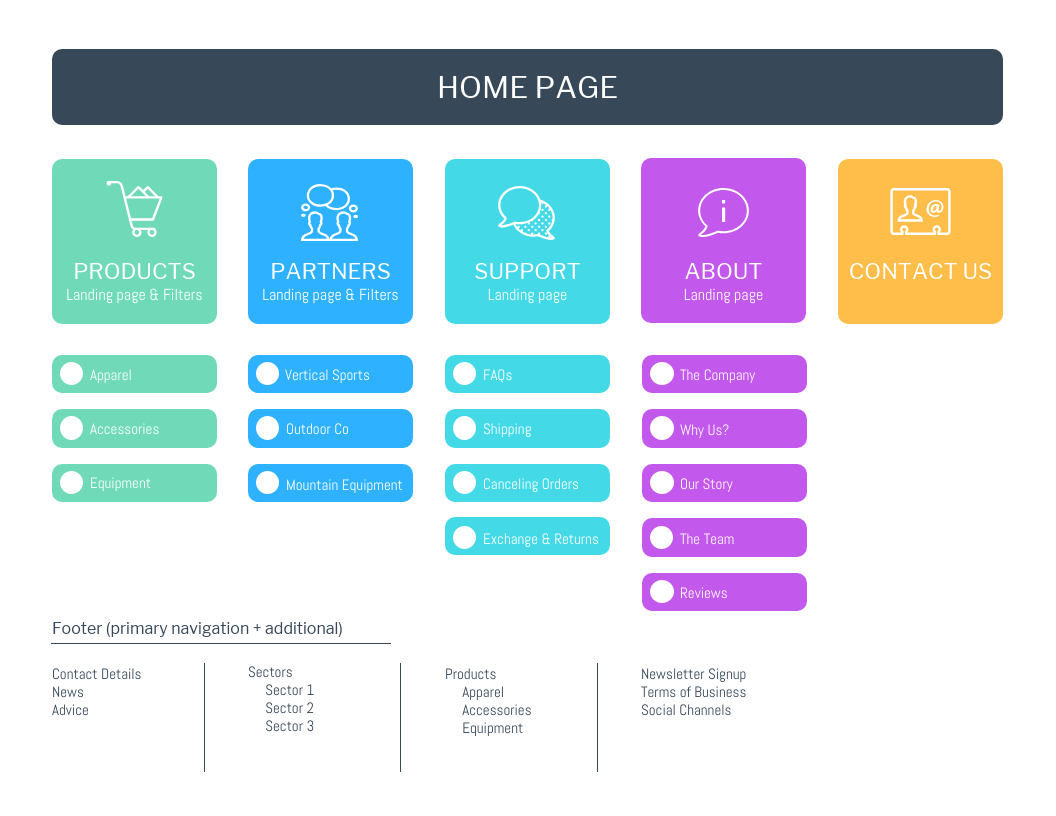A sitemap is a file that lists all the important pages and content of a website in an organized way, helping search engines like Google and Bing discover, crawl, and index your site more efficiently.
Types of Sitemaps
- XML Sitemap (For Search Engines)
- A machine-readable file in XML format.
- Lists URLs along with metadata (last update date, change frequency, priority).
- Example:
xml <?xml version="1.0" encoding="UTF-8"?> <urlset xmlns="http://www.sitemaps.org/schemas/sitemap/0.9"> <url> <loc>https://example.com/</loc> <lastmod>2024-05-20</lastmod> <changefreq>weekly</changefreq> <priority>1.0</priority> </url> </urlset>
- HTML Sitemap (For Users)
- A webpage that lists all major links for human visitors.
- Helps users navigate the website.
- Example:
html ¨K7K
Why Are Sitemaps Important?
✅ Better SEO – Helps search engines find and index pages faster.
✅ Improves Crawling – Especially useful for large or new websites.
✅ Handles Complex Sites – Helps with pages that aren’t well-linked.
✅ User Navigation (HTML sitemap) – Makes it easier for visitors to explore.
How to Create a Sitemap?
- For WordPress: Use plugins like Yoast SEO, Rank Math, or Google XML Sitemaps.
- For Static Websites: Use online generators like XML-Sitemaps.com.
- Manually: Code an XML/HTML file (as shown above).
Where to Submit a Sitemap?
- Google Search Console → Sitemaps section
- Bing Webmaster Tools → Sitemaps section
- Add to
robots.txt:
Sitemap: https://yoursite.com/sitemap.xmlBest Practices
✔ Update regularly when new pages are added.
✔ Include only important pages (don’t list duplicate or low-value content).
✔ Keep file size under 50MB (split into multiple sitemaps if needed).
Would you like help generating one for your specific website? 😊
There are several ways to create a sitemap, including automatic generation for WordPress sites and manual creation. Here are the most common methods:
For WordPress Websites
1. Using a Plugin (Recommended)
Install one of these plugins:
- Yoast SEO (most popular)
- Google XML Sitemaps
- All in One SEO Pack
Steps with Yoast SEO:
- Install and activate Yoast SEO plugin
- Go to SEO → General → Features
- Ensure “XML Sitemaps” is enabled
- Click “Save Changes”
- Your sitemap will be automatically available at
yoursite.com/sitemap_index.xml
2. Manual PHP Code for WordPress
Add this to your theme’s functions.php:
function generate_sitemap() {
$postsForSitemap = get_posts(array(
'numberposts' => -1,
'orderby' => 'modified',
'post_type' => array('post','page'),
'order' => 'DESC'
));
$sitemap = '<?xml version="1.0" encoding="UTF-8"?>';
$sitemap .= '<urlset xmlns="http://www.sitemaps.org/schemas/sitemap/0.9">';
foreach($postsForSitemap as $post) {
setup_postdata($post);
$postdate = explode(" ", $post->post_modified);
$sitemap .= '<url>'.
'<loc>'. get_permalink($post->ID) .'</loc>'.
'<lastmod>'. $postdate[0] .'</lastmod>'.
'<changefreq>monthly</changefreq>'.
'<priority>0.8</priority>'.
'</url>';
}
$sitemap .= '</urlset>';
$fp = fopen(ABSPATH . 'sitemap.xml', 'w');
fwrite($fp, $sitemap);
fclose($fp);
}
add_action("publish_post", "generate_sitemap");
add_action("publish_page", "generate_sitemap");For Any Website (Manual Creation)
XML Sitemap Format
<?xml version="1.0" encoding="UTF-8"?>
<urlset xmlns="http://www.sitemaps.org/schemas/sitemap/0.9">
<url>
<loc>https://www.example.com/</loc>
<lastmod>2023-10-01</lastmod>
<changefreq>weekly</changefreq>
<priority>1.0</priority>
</url>
<url>
<loc>https://www.example.com/about</loc>
<lastmod>2023-09-15</lastmod>
<changefreq>monthly</changefreq>
<priority>0.8</priority>
</url>
</urlset>HTML Sitemap Example
<!DOCTYPE html>
<html>
<head>
<title>Site Map</title>
</head>
<body>
<h1>Website Sitemap</h1>
<ul>
<li><a href="/">Home</a></li>
<li><a href="/about">About Us</a></li>
<li><a href="/services">Services</a>
<ul>
<li><a href="/services/web-design">Web Design</a></li>
<li><a href="/services/seo">SEO</a></li>
</ul>
</li>
<li><a href="/contact">Contact</a></li>
</ul>
</body>
</html>Submit Your Sitemap to Search Engines
- Google: Submit through Google Search Console
- Bing: Submit through Bing Webmaster Tools
- Add this to your
robots.txt:
Sitemap: https://www.yoursite.com/sitemap.xmlRemember to update your sitemap regularly, especially when you add new content to your website.
